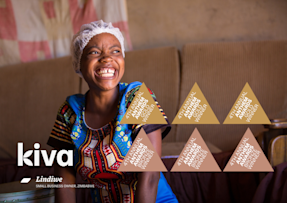The power of Kiva.org is in facilitating communication between the developing world and the developed world. Pictures, words, data in the form of loan repayments, they all tell us something about the lives of people who can live very far from us geographically, but are similar to us in so many ways.
Greg Kelly, is a staff member for REDC (Regional Economic Development Center) in Sliven, Bulgaria. Greg recently shared some of his experiences as a loan officer for a Kiva Partner:
"As I was completing the paperwork for our partnership with Kiva, a tall, dark-skinned young man entered my office. Angel Asenov looked like a stereotypical Roma. His teeth were crooked, the grease on his hands suggested that he had recently taken apart a car engine and he was covered in a crust of dried sweat. He spoke with an accent that confirmed the socioeconomic status that his appearance suggested. For 15 years, he had worked at a bicycle shop in the center of Sliven. Now the shop was closed and he had plans to start his own repair shop in the Roma neighborhood, but needed the capital to get started. Angel had been to each of the six banks in town, all of which had turned him down.Angel has since applied for a second loan, which has already been funded.
Over the next several weeks, we put together a business plan and arranged for an $850 loan through Kiva. On his first attempt to purchase the bulk of his equipment, the proprietor of a hardware store refused to serve Angel. My director and I returned with him so that he could purchase the metalworking tools he needed. Nine months of sweat later, Angel beams with the confidence of a self-made millionaire, sharing in the secret that the only limitation to his ambitions lies within his imagination. He has paid his original loan back in full and has taken a second in order to upgrade some of his equipment. Using the same equipment he uses to straighten bike frames, he rigged together a cart that attaches to the back of his bike. When business is slow, he puts his equipment in the cart and pedals around the ghetto looking for bent metal doors and window frames to fix for a modest fee. He plans now to sell bikes, and is attempting to work out a leasing option for his clients through one of the banks in town. All of this happens out of a single room bolted on to his house.
Word of Angel’s achievement spread both within and beyond the ghetto, landing in a national newspaper. Demand for these small loans far surpassed my expectations. My current client list includes bakers, barbers, bartenders, convenience store and sandwich stand proprietors, musicians and walnut crackers, all of whom have learned to help themselves in an honest fashion.
While intellectually I had understood the power of capitalism from the comfort of banking and private equity jobs, seeing its transformative power on the lives of these Roma reinforced how individual empowerment can be a sustainable agent of positive change. A world that is inhabited by an optimistic race, whose joy of living is on the rise, is a more stable and peaceful world to the benefit of us all. The opportunity capitalism brings is felt not only at a macro level in national statistics, but in the hearts and minds of those who choose to participate by changing what they are able to provide for themselves and their families.
On one of my regular rounds to collect loan payments, I came to the shop of a woman who had opened a small café and food pantry six weeks prior. Angelina raises her two children alone in a one-room shack for nine months out of every year while her husband seeks work abroad. She was now scheduled to make her first payment on a $1,000 loan. As I stepped into her store our eyes met and she burst into tears. Damn, I thought, she’s going to default. But before I could ask her what had gone wrong, she came out from behind the counter and put her arms around me. In Bulgaria, parents are required to purchase their children’s school materials. I found out later that for the first time, both of Angelina’s children had textbooks. Upon hearing the excitement, Angelina’s daughter walked into the store and looked up at us. “He helps,” said Angelina. It was all she could think of to explain the situation. She wiped her nose dry with one hand and held onto my arm with the other. But I hadn’t given her anything. Angelina had no one to thank but herself."
Angelina has made her first loan repayment of $65.
Thanks to Greg Kelly for sharing his experience with us, and for working so hard with REDC's clients.
To see footage of Greg and Angel in Sliven, tune in to Current TV to watch the pod EBay for Do-Gooders.
PREVIOUS ARTICLE
Kiva.org announces first partnership in Vietnam: Mekong Plus →NEXT ARTICLE
Get Involved!! →













